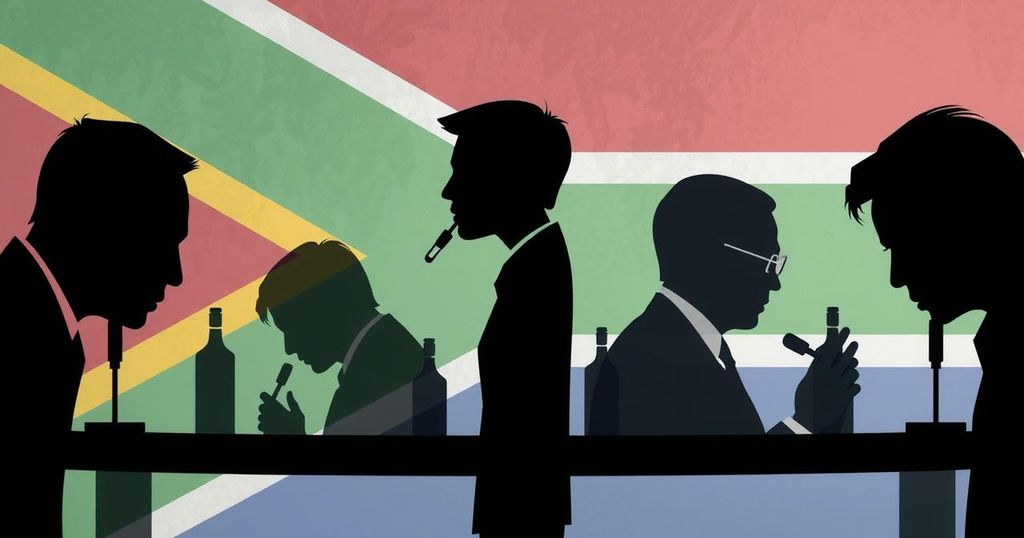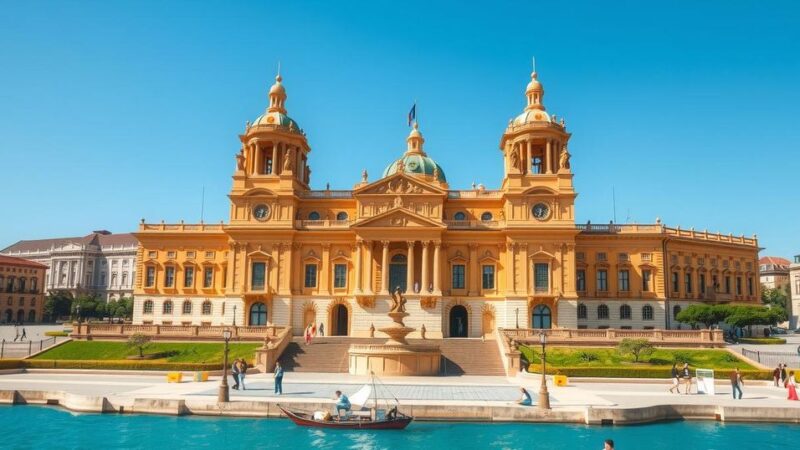Mlungisi Makhanya, leader of Eswatini’s main opposition party, has allegedly been poisoned in an assassination attempt. His hospitalization in South Africa comes as he prepares for new pro-democracy protests. The Eswatini government denies any involvement, amidst a backdrop of previous violent crackdowns on dissent and ongoing criticism of King Mswati III’s regime.
Eswatini’s principal opposition party has raised grave concerns regarding the alleged poisoning of its leader, Mlungisi Makhanya, asserting it to be an assassination attempt. This incident has cast a spotlight on Eswatini, one of the final absolute monarchies in the world, known for its oppressive stance towards pro-democracy movements. According to the People’s United Democratic Movement (Pudemo), Mr. Makhanya was hospitalized due to poisoning in South Africa. While the party confirmed he was under security protection, they refrained from providing additional details regarding his health or the specific circumstances leading to the alleged incident. Mr. Makhanya had recently announced that new pro-democracy protests were planned in Eswatini for the following month. In response, government spokesperson Alpheous Nxumalo dismissed any allegations of governmental involvement in the incident. Under the reign of King Mswati III, who has exercised unprecedented power since ascending to the throne in 1986 at the tender age of 18, Eswatini operates in an environment where political dissent is virtually nonexistent. His administration has faced condemnation from various human rights organizations for its oppressive tactics against pro-democracy advocates. In the year 2021, the country was engulfed by pro-democracy protests, which represented the most significant challenge to King Mswati’s authority, resulting in the deaths of at least 46 individuals due to excessive force employed by security forces, according to reports from Human Rights Watch. Furthermore, the assassination of human rights attorney Thulani Maseko, a member of Pudemo, drew significant attention when he was killed in front of his family, with Mr. Makhanya asserting it was politically motivated. Despite such claims, the government maintained its denial of involvement, and accountability for such acts remains elusive. The recent allegations regarding Mr. Makhanya’s poisoning prompted strong reactions from various South African political entities, including the Economic Freedom Fighters, which characterized the situation as a sign of the oppressive nature of the Mswati regime. They reported that Mr. Makhanya was discovered incapacitated at his residence in South Africa as he prepared to take charge of the upcoming protests. Political parties in Eswatini have faced suppression since the 1970s, with existing laws prohibiting their active participation, despite some parties currently operating under restrictions. The king maintains the authority to appoint the prime minister and a majority of the Senate, projecting extensive control over the legislative process, including the ability to enact laws through decrees. While King Mswati leads a lifestyle characterized by opulence, his subjects contend with significant socioeconomic challenges, including widespread poverty, prompting heightened calls for democratic reforms and greater accountability within the governmental framework.
The political climate in Eswatini is marked by a long-standing struggle for democracy amidst a monarchy led by King Mswati III. Since assuming the throne at the age of 18 in 1986, King Mswati has maintained strict control over all levels of government, stifling political opposition and dissent. The oppressive government tactics have drawn widespread criticism from human rights organizations, particularly in light of violent crackdowns on protestors. In 2021, a series of pro-democracy demonstrations led to tragic violence and casualties, highlighting the urgent need for reform. The recent actions taken against prominent opposition leaders like Mlungisi Makhanya illustrate the ongoing risks faced by those advocating for democracy in Eswatini.
The alleged poisoning of Mlungisi Makhanya, leader of the People’s United Democratic Movement, underscores the precarious situation of political activism in Eswatini, a country that has perpetually resisted democratic change under the absolute rule of King Mswati III. The government’s denials and failure to protect human rights continue to raise alarms about the state of governance in this southern African nation. As Makhanya prepares for upcoming protests, the tension surrounding his safety and the broader struggle for political freedom remains a critical issue. The international community must closely monitor this situation and advocate for accountability and reform.
Original Source: www.theguardian.com





